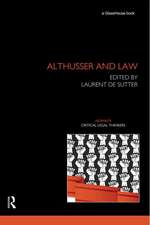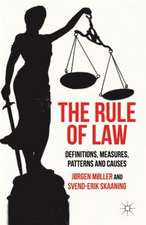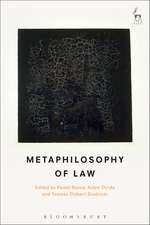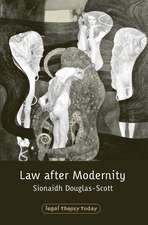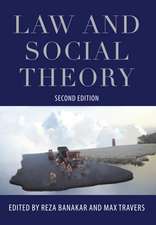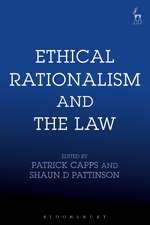Legal Validity: The Fabric of Justice: European Academy of Legal Theory Series
Autor Maris Köpckeen Limba Engleză Paperback – 30 sep 2020
| Toate formatele și edițiile | Preț | Express |
|---|---|---|
| Paperback (1) | 236.19 lei 6-8 săpt. | |
| Bloomsbury Publishing – 30 sep 2020 | 236.19 lei 6-8 săpt. | |
| Hardback (1) | 496.64 lei 6-8 săpt. | |
| Bloomsbury Publishing – 23 ian 2019 | 496.64 lei 6-8 săpt. |
Din seria European Academy of Legal Theory Series
- 30%
 Preț: 542.02 lei
Preț: 542.02 lei - 7%
 Preț: 348.20 lei
Preț: 348.20 lei - 23%
 Preț: 199.83 lei
Preț: 199.83 lei - 23%
 Preț: 179.10 lei
Preț: 179.10 lei - 17%
 Preț: 329.64 lei
Preț: 329.64 lei - 30%
 Preț: 716.07 lei
Preț: 716.07 lei - 14%
 Preț: 568.71 lei
Preț: 568.71 lei - 30%
 Preț: 569.53 lei
Preț: 569.53 lei - 31%
 Preț: 771.42 lei
Preț: 771.42 lei - 30%
 Preț: 539.42 lei
Preț: 539.42 lei - 30%
 Preț: 602.50 lei
Preț: 602.50 lei - 30%
 Preț: 540.80 lei
Preț: 540.80 lei - 14%
 Preț: 566.78 lei
Preț: 566.78 lei - 22%
 Preț: 237.02 lei
Preț: 237.02 lei - 22%
 Preț: 237.10 lei
Preț: 237.10 lei - 22%
 Preț: 249.91 lei
Preț: 249.91 lei - 19%
 Preț: 303.06 lei
Preț: 303.06 lei - 30%
 Preț: 509.45 lei
Preț: 509.45 lei
Preț: 236.19 lei
Preț vechi: 304.93 lei
-23% Nou
Puncte Express: 354
Preț estimativ în valută:
45.19€ • 47.31$ • 37.40£
45.19€ • 47.31$ • 37.40£
Carte tipărită la comandă
Livrare economică 05-19 aprilie
Preluare comenzi: 021 569.72.76
Specificații
ISBN-13: 9781509945245
ISBN-10: 1509945245
Pagini: 200
Dimensiuni: 156 x 234 mm
Greutate: 0.29 kg
Editura: Bloomsbury Publishing
Colecția Hart Publishing
Seria European Academy of Legal Theory Series
Locul publicării:London, United Kingdom
ISBN-10: 1509945245
Pagini: 200
Dimensiuni: 156 x 234 mm
Greutate: 0.29 kg
Editura: Bloomsbury Publishing
Colecția Hart Publishing
Seria European Academy of Legal Theory Series
Locul publicării:London, United Kingdom
Caracteristici
The author was winner of The European Award of Legal Theory in 2011 for the best doctoral thesis in the area of legal theory and philosophy of law.
Notă biografică
Maris Köpcke is a Research Fellow at the Faculty of Law, University of Oxford, and a Lecturer at the Faculty of Law, University of Barcelona.
Cuprins
1. Introduction: Why Legal Validity? I. An Intriguing Fact II. The Code Idea III. A Neglected Question 2. Legal Power I. The Task Ahead II. Facilities to Change Legal Positions III. Super-Tramp IV. Raz's Take V. Facilities Revisited, or Robert's Home Move 3. Intention in Valid Acts I. Four Peculiar Traits II. The Technique of Communication III. Codes, or How to Speak Your Mind IV. Back to Law V. Valid Acts That Invoke a Legal Regime VI. Valid Acts That Circulate VII. Unintentional Valid Acts VIII. Failed Attempts IX. The Technique of Legal Validity 4. Justice and Convergence I. Duties of Justice II. Specific Convergence III. The Scope of Specific Convergence IV. Marking and Enforcing V. Law's Marking: Legal Validity VI. Two Levels of Convergence 5. Reasons to Empower I. Empowerment II. Expertise and Capacity III. Proximity IV. The Rule of Law: Rulings V. The Rule of Law: Rulings About Validity VI. The Rule of Law: General Law-Making VII. Self-Direction 6. The Systemic Character of Legal Meaning I. The Moral Need for Law's Positivity A. Determinacy B. Ease of Identification C. Targeted Crafting II. The Systemic Character of Legal Meaning III. A Function of the Acts of Others IV. Legal Meaning Through Time V. A Single Author? VI. Threads in a Fabric 7. Conclusion: The Fabric of Justice I. The Strength of Limited Power II. Validity's Spell
Recenzii
There are a couple of wonderful things about this book. One is certainly the clearness of language and the general accessibility of her work. Another is her explicit focus on the technical aspect of the law, i.e., on the law as a specific social technique. This presents a welcome shift from a rather unfruitful focus on the law's essence to its functioning (note, not its function!), i.e., from what the law is to how exactly the law does what it does.
Köpcke's insightful, thorough, elegantly written, and rigorous treatment of legal validity deserves a careful reading. Indeed, it is my belief that anyone interested in fundamental legal questions will find Legal Validity: The Fabric of Justice a stimulating, instructive, and refreshing work.
[A]n extremely rich and significant book which displays the excellent analytical and philosophical gifts of its author.
Köpcke's insightful, thorough, elegantly written, and rigorous treatment of legal validity deserves a careful reading. Indeed, it is my belief that anyone interested in fundamental legal questions will find Legal Validity: The Fabric of Justice a stimulating, instructive, and refreshing work.
[A]n extremely rich and significant book which displays the excellent analytical and philosophical gifts of its author.




